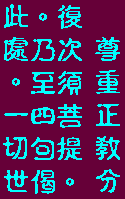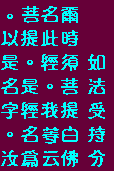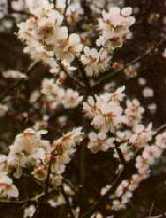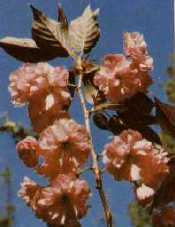CONTENTS
Commentary on Chapter 12 "Revering the
Orthodox Teaching"
 "Moreover, Subhuti, you should know that all the Gods, men, and Asuras of the
world should make offerings to any place at which even so few as four lines of
verse from this Sutra are spoken and so forth, just as they would to a
Buddha's shrine or temple; how much the more so to any place where people can
completely receive, hold, read and recite the Sutra. Subhuti, you should know
that such people accomplish the foremost and most rare of dharmas. In any
place the Sutra text is found, there is the Buddha or a reverent disciple.
"Moreover, Subhuti, you should know that all the Gods, men, and Asuras of the
world should make offerings to any place at which even so few as four lines of
verse from this Sutra are spoken and so forth, just as they would to a
Buddha's shrine or temple; how much the more so to any place where people can
completely receive, hold, read and recite the Sutra. Subhuti, you should know
that such people accomplish the foremost and most rare of dharmas. In any
place the Sutra text is found, there is the Buddha or a reverent disciple.
It is the continuation of the previous chapter.
Only gods, men and Asuras are specifically mentioned in this chapter, because they are beings in Three Good Paths. The other three of the Six Paths of Rebirth i.e. animals, hungry ghosts and beings in the hell (Three Evil Paths) are not easy to make offerings to the Triple Jewels.
The Buddha, Prajna Sutra and Disciples as mentioned in this chapter are the Three Jewels in Buddhism. They are three in one and it is one to three. In any place the sutra text is found, there is the Buddha or a reverent disciple. Thus, all people who see the Sutra should respect it.
It is important to explain why the blessings and virtues of speaking the sutra, or even four lines, to others is greater than that of giving Seven Precious Gems in Three Thousand Great Thousand World Systems:

Commentary on Chapter 13 "Receiving and Holding
'Thus' Dharma"
The Buddha told Subhuti, "The name of the Sutra is Vajra Prajna Paramita. You
should respect and hold it by that name. And why? Subhuti, Prajna Paramita
is spoken of by the Buddha as no Prajna Paramita, therefore it is called
Prajna Paramita.
"Subhuti, what do you think? Is there any dharma spoken by the Tathagata?"
Subhuti said to the Buddha. "World Honored One, nothing has been spoken by
the Tathagata."
"Subhuti, what do you think? Are all the motes of dust in three thousand
great thousand world systems many?"
Subhuti said, "Very many, World Honored One."
"Subhuti, all motes of dust are spoken of by the Tathagata as no motes of
dust, therefore they are called motes of dust. The world systems are spoken
of by the Tathagata as no world systems, therefore they are called world
systems."
"Subhuti, what do you think, can the Tathagata be seen by means of the
thirty-two marks?"
"No, World Honored One, one cannot see the Tathagata by means of the
thirty-two marks. And why? The thirty-two marks are spoken of by the
Tathagata as no thirty-two marks, therefore they are called thirty two marks."
 Then Subhuti said to the Buddha, "World Honored One, what should the Sutra be
named? How should we respect and hold it?"
Then Subhuti said to the Buddha, "World Honored One, what should the Sutra be
named? How should we respect and hold it?"
"Subhuti, a good man, or good woman, might give up his life as many times as
there are grains of sand in the Ganges River; but if a person were to receive
and hold even so few as four lines of verse of the Sutra and explain them for
others, his blessing would be greater."
At this point the Sutra in its first form probably finished.
As the merit and virtue of respecting and holding this sutra is limitless, there must be a name for the sutra in order to facilitate circulation in the worlds. Thus Subhuti asked, "What should the Sutra named? How should one respect and hold it?"
Shakyamuni said, "The name of the Sutra is Vajra Prajna Paramita. You should respect and hold it by that name."
It should note that this Sutra reveals the ultimate truth. It is as non-destructive as Vajra (i.e. diamond). The Prajna i.e. real mark Prajna is as sharp as Vajra cutting off the Four Marks of both self and Dharma. The perfection of Six Paramita is only achieved through cultivation with the real mark Prajna (i.e. no mark Prajna) and pure heart (i.e. heart dwelling nowhere).
As the name of the Sutra covers the entire meaning of the Sutra, Shakyamuni indicated that one can respect and hold the Sutra by just reading and reciting the name of the Sutra.
 As all Dharmas are ultimately empty, is it controversial to give a name to the
Sutra? Can a false name interpret a real truth? Certainly, in order to comply
with the needs of beings, the Buddha spoke of the existence of Prajna Paramita.
But those who saw no further than common truth developed an attachment for Prajna
Paramita, which was basically false. The real truth is beyond spoken language
and written words, thus the name does not exist. If it is spoken from the point
of view of the Middle Way, it is a false name call Prajna Paramita,
and nothing more.
As all Dharmas are ultimately empty, is it controversial to give a name to the
Sutra? Can a false name interpret a real truth? Certainly, in order to comply
with the needs of beings, the Buddha spoke of the existence of Prajna Paramita.
But those who saw no further than common truth developed an attachment for Prajna
Paramita, which was basically false. The real truth is beyond spoken language
and written words, thus the name does not exist. If it is spoken from the point
of view of the Middle Way, it is a false name call Prajna Paramita,
and nothing more.
So, do not be attached. Do not be attached to emptiness nor existence. Do not become attached to self nor Dharmas. If one says there certainly is Prajna Paramita, that is an attachment; so the Buddha explicitly added that is no Prajna Paramita, which is the actual truth.
Clearly the Buddha spoke Dharma, and yet he asked if he had spoken Dharma. Subhuti replied that he had not spoken Dharma. Buddha Dharma is always described to be inconceivable and not spoken of. There are several meanings:
Shakyamuni illustrated the doctrine with the example of the physical world, which is formed by all motes of dust. "Motes of dust" and "the world" are just false names, and they have no real substance themselves. Their existence is due to our attachment to self and Dharma. Particulars of dust verging on emptiness make up the world. A mote of dust is the smallest form of dependent retribution. The world is the largest dependent retribution formed by a collection of all motes of dust. If motes of dust were separated, the world would disappear. Dependent retribution forming the world is empty.
Again, the thirty-two marks are the marks of the Response Body of the Buddha. They are formed by the proper retribution attached by the sentient beings. They are empty too, as they are conditioned. The Buddha Body is the Dharma Body, which has no mark.
 In Chapter 5, the Sutra states that
In Chapter 5, the Sutra states that
In Chapter 20, the Sutra states that
When Shakyamuni Buddha was on the causal ground, he gave up a thousand bodies and lives to rescue and take living beings across. However the Buddha indicated that the blessings and virtues of receiving and holding this Sutra are greater than those of giving up the body and life, and also those of giving any amount of money. Now, knowing the supreme excellence of the Sutra, it is imperative for us to believe, understand, receive and hold the Sutra without hesitation.